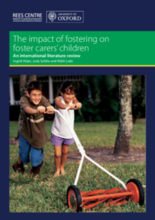This literature review by the Rees Centre for Research in Fostering and Education at the University of Oxford was undertaken to identify the ways in which carers’ children might be more effectively prepared and supported when their families are fostering. When a family experiences the transformation to a family who fosters, there will be many changes in family relations and general family life. Yet the impact of fostering on the lives of the sons and daughters of foster carers has largely been overlooked both in research and practice. This review included 17 studies from the UK, US, Canada, Sweden, Belgium and Spain. Although the report underlines that each fostered child and each carer’s child is an individual, some clear messages emerged from this literature review. In particular, it highlights the importance of involving children and young people in carers’ families in family discussions concerning the decision to foster, and that they should not be seen as less significant, passive members of the family. Being informed about fostering and about each particular child reduces conflicts. When the family has made the decision to become foster carers, children and young people similarly need to be informed about the nature of fostering - both positive and negative aspects. The review found that those children and young people who had received relevant information developed a significantly better relationship with foster children.
The review also found that foster carers needed to identify ‘protected’ time for their children, as in many of the studies children and young people stated that their parents spent insufficient time with them and were unable to listen to them adequately due to the demands of fostering. Although providing information to the children and young people of foster parents was identified as key, limiting information, in particular sensitive information in some context was also found to be important. Some of the studies found that children sometimes had to process information about abuse, neglect and violence that was very challenging, particularly for younger children. Children being able to have open discussions about perceived difficulties, primarily with their parents, but also with social workers was also identified as one factor that improved their capacity to cope with problems. The ending of placements was found to be one of the most difficult aspects of fostering, with some children reporting not being informed when a child was moved from the family, and their feelings of grief and loss were not properly recognized. The review makes important recommendations on better engaging foster carer’s children in the fostering process but also on the implications of the findings for training and professional development of social workers and school staff.
©Rees Centre for Research in Fostering and Education University of Oxford

